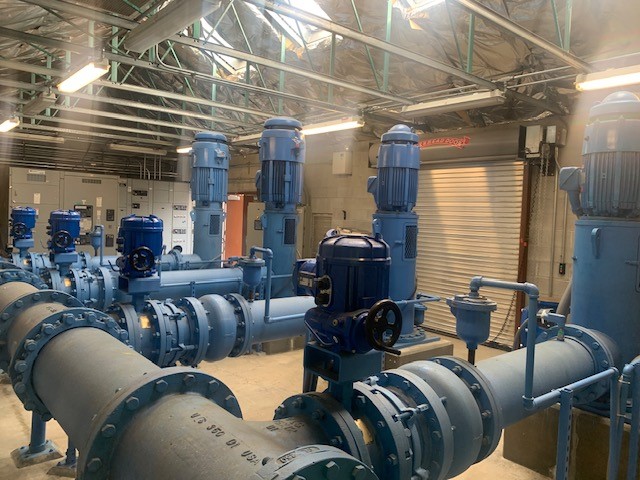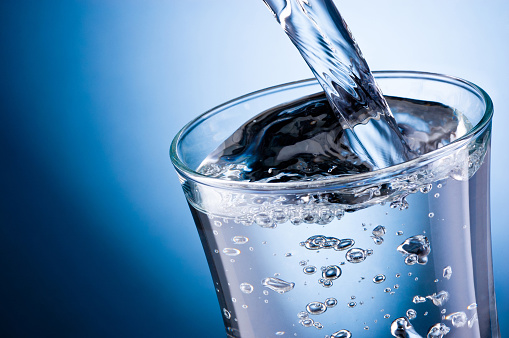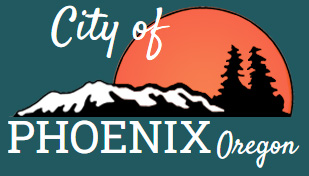Water

The City of Phoenix currently conducts water quality testing for more than 100 water quality parameters, som of which are monitored for our own information and are not required. Test results are regularly submitted to the Oregon Health Division. While the vast majority of substance monitored are not found within our water, or may not be considered as posing a health risk, information on them can still be useful. If you desire further information, a complete summary of test results is also available by contacting the Public Works Department at (541) 535-2226.
Water Supply
The water supply for the City of Phoenix is purchased from the Medford Water Commission. The Commission utilizes water from two main sources. During the winter months all their water (and ours) is supplied by the Big Butte Springs, which is located about thirty miles northeasterly of Medford near Butte Falls. The water from the springs is considered a groundwater supply.
When summer demands exceed the capacity of the Big Butte Springs (typically from May through September) surface water from the Rogue River is used as a supplemental supply. this water is pumped from the river and treated at the Robert A Duff water treatment plant, located on Table Rock Road near TouVelle Park. The City of Phoenix has one thousand acre feet of water storage in Lost Creek Reservoir that is released down the Rogue River to offset the Medford Water Commission supply that Phoenix uses.
During the times when both sources are being utilized, the water blends within the Commission's distribution system, although some areas may tend to receive more water from one source or the other. Those areas farthest from the Duff plant typically receive more of the springs water (as is the case for the City of Phoenix). However, the finished water from both supplies is very similar, with temperature being the most detectable difference.
Water Quality - Is Our Water Safe?

Water suppliers now test and treat water at increasingly stringent levels for an expanding array of biological and chemical contaminants, some of which were unknown or not understood only a decade or two ago. While water treatment and monitoring guidelines have increased, our water consistently exceeds all state and federal standards.
It is noted, however, that some people may be more vulnerable to contaminants in drinking water than the general population. Immune-compromised persons such as persons with cancer undergoing chemotherapy, persons who have undergone organ transplants, people with HIV/AIDS or other immune system disorders, some elderly, and infants can be particularly at risk from infections. These people should seek advice about drinking water from their health care providers. EPA/CDC guidelines on appropriate means to lessen the risk of infection by Cryptosporidium and other microbial contaminants are available from the Safe Drinking Water Hotline (800-426-4791).
Water Sample Reports
Below is a link to Oregon Health Authority's Drinking Water Data Online system. Here you can access a fair amount of data on public water systems in Oregon. You can find data such as coliform testing, chemical testing, contacts, violations, enforcements, public notices, and basic system information.
Use the Water System Search page to find a water system. You can enter the water system ID number if you know it, or you can search by water system name or location.
Data shown there is "live" data. That means it's as current as the reports we have in our system. This is the same data that Drinking Water Services (DWS) staff see and use. If something is missing, that usually means it has not been reported to us or we have not entered it yet.
Click Here for Water Sample reports for the City of Phoenix.
Water Planning & Conservation
The City owns and operates a potable water system (Public Water System Identification Number 00625) and complies with all regulatory standards for managing a public water system in the state of Oregon. In 2017 the City served a population of approximately 4,605 through approximately 1,400 connections. Water to the City is supplied from the Medford Water Commission (MWC) through a
regional transmission system called the “TAP” supply system (Talent, Ashland, and Phoenix). As a result, the City does not operate or maintain its own source of water, rather its operations are solely those of local storage and distribution.
Four planning periods were included the most recent water master plan update; existing conditions (year 2017), short-term operating conditions (year 2025), mid-term operating conditions (year 2040) and long-term operating conditions (buildout - year 2070). The study area for the master plan includes the City’s current service area, its current urban growth boundary, and future growth areas as determined by the City in coordination with regional planning efforts under Jackson County. The City’s existing and predicted future service areas for this planning period are shown in the graphics to the right. Future water master plan
updates will be able to capture changes in planning assumptions that occur after the completion of this master plan.
